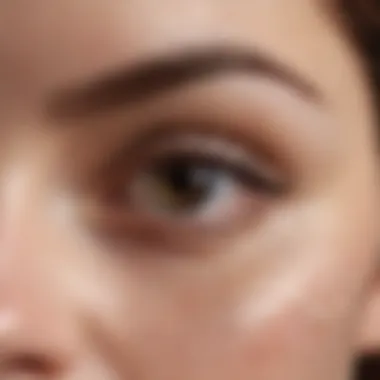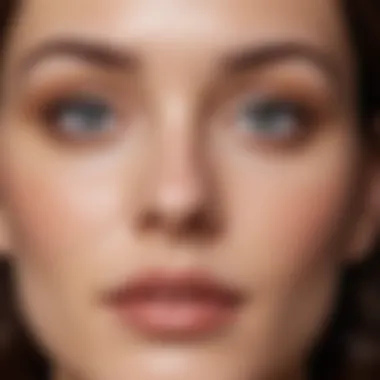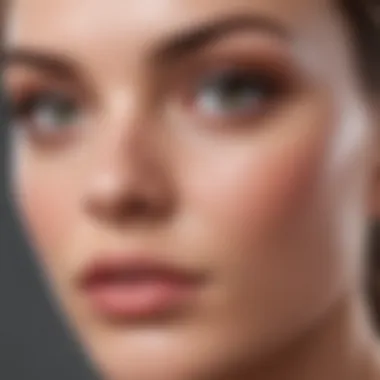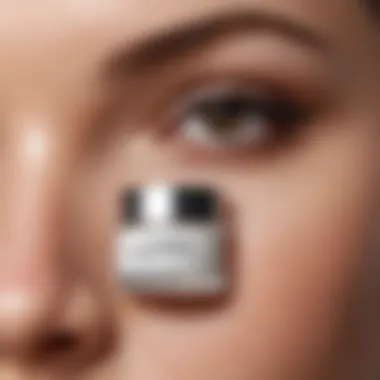Top Dermatologist-Recommended Retinol Eye Creams


Intro
Retinol eye creams have gained significant attention in recent years, particularly among individuals seeking to address signs of aging and enhance skin vitality. This article delves into the nuances of selecting the right retinol eye creams, backed by insights from dermatologists. With the increasing options available on the market, understanding how retinol works, along with its benefits and potential side effects, is essential for making informed decisions. The delicate skin around the eyes requires specific consideration; hence, professionals emphasize the significance of choosing products that not only manage results effectively but also minimize risks.
Key Trends
As interest in skincare evolves, several prevalent trends regarding the use of retinol eye creams have emerged.
Overview of Current Trends
Dermatologists have noted a growing preference for subtler formulations of retinol, which cater to various skin sensitivities while still providing effective results. Innovations in delivery systems have made it possible for products to penetrate deeper layers of the skin, maximizing efficacy without causing heightened irritation.
Popular Beauty Trends
- Ingredient Transparency
Consumers are increasingly aware and informed about the ingredients in their skincare products. Many prefer brands that provide detailed information about their formulations, including concentrations of active ingredients like retinol. - Holistic Approaches
Many skincare routines now incorporate not just topical applications but also behavioral shifts, such as adequate hydration and sun protection, to complement the effects of retinol. - Personalization
Tailored skincare regimens designed for specific age-related concerns are becoming standard. Retinol eye creams are being customized based on individual needs and skin types.
Beauty Tips and Tutorials
To effectively incorporate retinol eye creams into your regimen, consider the following recommendations:
Skincare Routines for Different Skin Types
- Sensitive Skin: Start with a low concentration of retinol. Look for formulations with soothing agents like chamomile or aloe vera.
- Oily Skin: Opt for lightweight, oil-free retinol creams that will not clog pores.
- Dry Skin: Choose richer, more hydrating formulations with retinol combined with moisturizing agents, such as hyaluronic acid.
Application Techniques
- Cleanse the skin thoroughly before application.
- Apply a pea-sized amount around the eye area using your ring finger to minimize pressure.
- Use the product in the evening to reduce the risk of irritation from sun exposure.
Sustainable Practices
As sustainability becomes a greater priority in the beauty industry, consumers are encouraged to consider the ecological impact of their skincare choices.
Understanding Sustainable Beauty
Many brands are now focusing on eco-friendly packaging and ethically sourced ingredients. This reflects a broader trend towards minimizing the environmental footprint of personal care products.
Tips for Sustainable Practices
- Choose brands that prioritize refillable or recyclable packaging.
- Support clean beauty brands that avoid harmful chemicals.
- Opt for products that promote sustainable sourcing of ingredients.
Understanding the key elements of retinol eye creams empowers consumers to select products that align with their skincare goals while adhering to ethical standards. Through informed choices and proper application, one can effectively improve the eye area's appearance and health.
Prelude to Retinol in Skincare
Retinol has earned its prominent status in skincare largely due to its proven efficacy in addressing various skin concerns. For individuals seeking not only to maintain skin health but also to combat signs of aging, an understanding of retinol's properties is fundamental. The importance of this section lies in establishing a foundation for readers, especially women of all ages, who are considering incorporating retinol into their routines. It is also vital to acknowledge that while retinol is a powerful ingredient, its optimal use can significantly enhance the benefits it provides.
Understanding Retinol
Retinol, a derivative of Vitamin A, plays an essential role in skin health. It operates at a cellular level, promoting cell turnover and enhancing collagen production. This leads to a smoother, more youthful complexion. Retinol works by penetrating the skin and influencing its biological processes. For example, it can help unclog pores, diminish acne scarring, and improve overall skin texture. This ingredient is widely recognized in dermatological circles for its versatility and effectiveness.
In the context of eye creams specifically, retinol offers unique advantages, as the skin around the eyes is generally thinner and more delicate than the rest of the face. This area can show signs of aging more readily. Therefore, understanding how retinol functions can empower users to choose products that are optimally formulated for their skin needs.
Role of Retinol in Anti-Aging


The anti-aging properties of retinol are perhaps the most compelling reason for its inclusion in modern skincare routines. Studies have shown that consistent use of retinol can reduce the appearance of fine lines and wrinkles over time. This is attributed to its ability to improve skin elasticity and firmness. By encouraging the production of collagen, retinol helps to plump the skin, minimizing age-related sagging.
Moreover, retinol is effective in evening out skin tone and diminishing the appearance of age spots or hyperpigmentation. As skin naturally loses its vitality with age, introducing retinol can serve as a proactive measure in preserving a youthful look. Its integration into an eye cream formulation further emphasizes its importance, as the eye area may need additional support due to daily expressions and environmental factors.
As you consider retinol's role in your skincare routine, it is also crucial to recognize that the efficacy of this ingredient is best realized when used correctly and consistently, ensuring long-term benefits for skin health.
The Unique Needs of the Eye Area
The skin around the eyes is distinctively different from the rest of the face. This area requires special attention and care. The skin here is thinner and more delicate, making it more vulnerable to damage. Therefore, understanding its unique characteristics is essential when selecting an effective retinol eye cream.
Thinner Skin Around the Eyes
The upper layer of skin around the eyes is approximately one-third the thickness of skin on other parts of the face. This fragility leads to increased susceptibility to irritation and signs of aging. The lack of oil glands in this area contributes to dryness, thus making hydration crucial. When choosing a retinol eye cream, consideration of its formulation is vital. Look for creams that offer a balance between effectiveness and gentleness. Eye creams that are too harsh can cause redness or discomfort, negating the desired benefits.
"A well-formulated retinol eye cream can provide the anti-aging benefits without compromising the delicate skin around the eyes."
Common Concerns: Dark Circles and Puffiness
Dark circles and puffiness are prevalent issues affecting many individuals. They can result from various factors including genetics, lack of sleep, and aging. Retinol can help with these concerns. By encouraging cell turnover and boosting collagen production, retinol cream can enhance skin texture and firmness. However, it is important to be realistic about expectations. While retinol can improve darkness or puffiness over time, it requires consistent use and may not provide instant results.
When dealing with puffiness, ingredients in addition to retinol may be beneficial, such as caffeine or peptides. These elements can quickly reduce swelling and improve overall appearance. Additionally, integrating a retinol eye cream into a broader skincare routine can be advantageous, ensuring that multiple concerns are addressed holistically.
In summary, the unique needs of the eye area necessitate a thorough understanding of the characteristics of this delicate skin. Choosing the right retinol eye cream can yield positive results, but individual needs and skin types should always be considered.
Benefits of Using Retinol Eye Creams
The incorporation of retinol eye creams into skincare routines holds notable significance. Retinol, as a derivative of vitamin A, possesses various properties that cater specifically to the delicate skin around the eyes. This skin is thinner and more prone to signs of aging compared to the rest of the face. As a result, targeting the unique needs of this area with effective ingredients like retinol can yield substantial benefits. In this section, we will explore how retinol eye creams can aid in reducing fine lines and improving overall skin tone and texture.
Reduction of Fine Lines and Wrinkles
Fine lines and wrinkles often begin to appear as early as the 30s. The skin loses elasticity and collagen production decreases. Retinol eye creams are effective because they promote cell turnover and stimulate collagen synthesis. According to dermatologists, consistent use of retinol can visibly lessen these signs of aging.
- Cell Regeneration: Retinol works to accelerate the skin's natural exfoliation process. This leads to fresh skin cells replacing the older ones, making fine lines less prominent.
- Collagen Boosting: By stimulating collagen production, retinol eye creams help to strengthen the skin structure. This results in a firmer and smoother appearance.
- Diminishing the Depth of Wrinkles: Regular use may soften existing wrinkles, making them appear shallower.
"Incorporating retinol into your skincare routine can transform the appearance of the skin around the eyes, helping to restore a youthful look," says Dr. Jane Smith, a dermatologist.
Improved Skin Tone and Texture
Along with firming and smoothing the skin, retinol eye creams also enhance skin tone and texture. Uneven skin tone and rough patches can develop due to sun damage or natural aging processes. Retinol addresses these issues effectively.
- Smoother Finish: The exfoliating properties of retinol help to refine the skin's surface, promoting a polished look.
- Evening Out Skin Tone: By targeting pigmentation irregularities, retinol eye creams can help to lighten dark circles or spots caused by hyperpigmentation.
- Radiance and Glow: Use of retinol can reveal a fresh and radiant complexion, combating dullness that often accompanies aging or fatigue.
Choosing the Right Retinol Eye Cream
Selecting a suitable retinol eye cream is critical for achieving desired results in your skincare routine. With so many products available, the right one can help manage various skin issues like fine lines, wrinkles, and uneven skin tone. Understanding formulation and concentration is essential to make an informed choice. The effectiveness of a retinol eye cream can vary significantly, depending on the specific ingredients used and their concentrations. Knowing what to look for can help you avoid ineffective products and potential irritation.
Formulation Considerations
The formulation of a retinol eye cream encompasses several key factors, such as type of retinol, additional active ingredients, and overall texture. Each of these aspects contributes to how well the product works and how it feels on the skin.
- Type of Retinol: There are various forms of retinoids, from retinol to retinaldehyde. Each type varies in potency and effects. Retinol is commonly used for its balancing properties, while retinaldehyde offers quicker results but may cause more irritation.
- Active Ingredients: Many eye creams include other beneficial components like hyaluronic acid for hydration, peptides for skin repair, and antioxidants to protect from damage. Look for products with a blend that suits your skin type and concerns.
- Texture and Absorption: The texture of the cream matters. Lighter, gel-based formulations may be preferred for oily skin, whereas richer creams may suit drier skin types. A formulation that absorbs well without leaving a greasy residue is often ideal for applying makeup afterward.
Concentration Levels of Retinol


When it comes to retinol, concentration levels play a pivotal role in the product’s effectiveness and the likelihood of skin irritation. A higher concentration often means quicker results, but it can also lead to redness and peeling. Therefore, it's crucial to identify the right concentration for your skin type:
- Beginners: If you are new to retinol, start with a lower concentration, such as 0.25% or 0.5%. This approach allows the skin to gradually acclimate, minimizing adverse reactions.
- Intermediate Users: For those with some experience using retinol eye creams, a concentration of 0.5% to 1% might be appropriate. This level usually provides significant benefits while still being manageable for the skin.
- Advanced Users: More experienced users may opt for formulations above 1%. However, it is advisable to monitor skin response closely to avoid over-exposure.
In summary, selecting the right retinol eye cream involves a comprehensive assessment of formulation and concentration levels. These elements directly impact not only the effectiveness of the product but also your overall skin health. Choosing wisely can pave the way for visible improvements, enhancing your skincare regimen amid a plethora of products.
Expert Recommendations from Dermatologists
When it comes to selecting retinol eye creams, the guidance of dermatologists proves invaluable. These professionals bring in-depth knowledge of skin health and are often on the front lines of skincare innovations. They understand the complexities of the eye area, which is distinct from the rest of the face due to its delicate skin. Their recommendations help individuals make informed choices that align with their specific skincare needs.
Dermatologists emphasize the significance of well-formulated products that incorporate retinol effectively. This is rooted in a clinical understanding of how retinol can improve skin texture, reduce signs of aging, and tackle common concerns like puffiness and dark circles. Moreover, professional consultations can help determine optimal concentrations and formulations based on one’s skin type and sensitivity levels, which are crucial for achieving satisfactory results.
"Choosing the right eye cream is essential, as the skin around the eyes is more susceptible to irritation, making expert advice paramount."
Furthermore, dermatologists often take into account the latest research in the field, guiding consumers toward products that have been clinically tested and proven effective. In this context, not only do their recommendations reflect a synthesis of personal experience, but they also embody scientific advancements in skincare.
Popular Products on the Market
Several eye creams on the market garner praise from dermatologists for their efficacy and safety. These products often feature varying retinol concentrations, allowing individuals to find the right match for their skin needs. Some of the most noted include:
- Retinol CORRECT Eye Cream: This product targets multiple signs of aging and has received endorsements for its gentleness and effectiveness.
- Neutrogena Rapid Wrinkle Repair Eye Cream: A favorite among dermatologists, it combines retinol with hydrating ingredients for a balanced approach.
- Olay Regenerist Retinol 24 Eye Cream: This one stands out for delivering results without overwhelming the delicate skin area.
These recommendations reflect a convergence of dermatological insight and consumer needs, highlighting options that effectively address various skin concerns.
Brands Recommended by Professionals
Several brands consistently appear on dermatologists’ recommend lists. These brands are renowned for their commitment to quality and research, which translates into effective formulations. Notable mentions include:
- La Roche-Posay: Celebrated for its dermatologist-tested formulas and focus on sensitive skin.
- SkinCeuticals: Known for using high-quality ingredients, their eye creams often include specialized delivery systems for retinol.
- Dr. Dennis Gross Skincare: This brand is frequently recommended for those seeking a blend of efficacy and gentle formulation.
Medical professionals appreciate these brands due to their transparency in ingredient sourcing and effectiveness in clinical trials. By choosing these trusted names, consumers can have a sense of assurance in their skincare journey.
Potential Risks and Side Effects
Understanding the potential risks and side effects of retinol eye creams is crucial for anyone considering their use. While retinol can provide significant anti-aging benefits, it can also lead to unwanted reactions in some users. Awareness of these possibilities helps in selecting the right product and applying it correctly.
Irritation and Sensitivity
Retinol, known for its effectiveness in promoting cell turnover, can cause irritation and sensitivity, particularly in the delicate area around the eyes. This skin is thinner and more susceptible than other facial regions. Common symptoms of irritation include redness, flaking, and a burning sensation.
Those with sensitive skin or conditions like eczema may experience heightened reactions. Because retinol initiates a process of exfoliation, it is essential to start with lower concentrations. A gradual introduction helps the skin adjust, reducing the likelihood of irritation.
Here are some signs of irritation to watch for:
- Redness: Noticeable color changes in the skin.
- Flaking: Visible skin peeling, particularly around the eye.
- Burning sensation: Feelings of warmth or stinging.
If irritation occurs, take a break from the product and reassess its application frequency or concentration. Consulting with a dermatologist can provide personalized guidance.
Importance of Patch Testing
Patch testing is an effective strategy before incorporating a new retinol eye cream into your regimen. This process allows individuals to gauge their skin's reaction to a product without the risk of a full application. The procedure typically involves applying a small amount of the product on a discreet area of skin, usually behind the ear or on the inner forearm, and monitoring for any adverse reactions.
Reasons to conduct a patch test:


- Identifies allergic reactions: Helps detect potential allergies to specific ingredients.
- Prevents widespread reactions: Limits adverse effects to a small area rather than the entire eye region.
- Offers peace of mind: Understanding how your skin reacts can provide confidence in product use.
It is better to spend a few days patch testing than to suffer from a broader reaction later.
In summary, while retinol eye creams offer remarkable benefits, awareness of the associated risks and adopting preventative measures like patch testing can lead to safer, more effective results. Always consider your unique skin type and response as part of your skincare journey.
Incorporating Retinol Eye Creams into Skincare Routine
Incorporating a retinol eye cream into a skincare routine can be crucial for achieving desired rejuvenation effects. Given the delicate nature of the skin around the eyes, it is essential to approach this addition thoughtfully. Retinol can enhance skin texture, reduce signs of aging, and address various concerns like dark circles. However, its use requires more than just applying the product. Understanding how and when to use it is equally important.
Timing and Frequency of Use
Timing and frequency of using retinol eye creams significantly impacts their effectiveness. Dermatologists typically recommend starting with a lower concentration and applying it only two to three times a week. Gradually increasing the frequency allows the skin to adjust and minimizes the risk of irritation.
For instance, application at night is often advised, as retinol can make the skin more sensitive to sunlight. After cleansing the face, the eye cream should be applied gently, using your ring finger to tap the product lightly around the orbital bone. It is best to wait at least a few minutes before applying other products, allowing the retinol to penetrate the skin adequately.
Complementary Skincare Products
Using the right complementary skincare products can amplify the effects of retinol eye creams. A gentle cleanser is essential to avoid stripping the skin barrier. Follow this with a hydrating serum focusing on ingredients such as hyaluronic acid or peptides, which can provide moisture and further support the skin.
Moreover, pairing the retinol eye cream with a broad-spectrum sunscreen during the day is crucial.
- Sunscreen: Protecting the delicate eye area from UV damage is vital, especially since retinol can heighten sun sensitivity.
- Moisturizer: Incorporating a lightweight, hydrating moisturizer can maintain skin’s moisture balance, reducing potential dryness from retinol use.
"A balanced skincare routine not only improves immediate results but also promotes lasting skin health."
The Importance of Professional Guidance
In the realm of skincare, especially for delicate areas like the eyes, professional guidance cannot be overstated. The molecular structure of retinol allows it to penetrate the skin effectively, but its potency requires careful management. Using a retinol eye cream without adequate understanding can yield varying results, some of which may be undesirable. Consulting with a qualified dermatologist ensures that individuals choose the right formulation tailored to their specific needs. This professional oversight can help mitigate risks, maximize effectiveness, and enhance overall skin health.
Consulting with a Dermatologist
A dermatologist brings expertise that goes beyond surface-level product knowledge. They can assess skin conditions and specific issues such as fine lines, dark circles, and sensitivity. A dermatologist also considers factors like age, skin type, and previous reactions to retinol. This personalized approach creates a foundation for selecting the correct retinol eye cream.
- Skin Type Evaluation: What works for oily skin may not suit dry skin. A dermatologist helps navigate these differences.
- Safety Assessment: Certain skin conditions or medications may alter how retinol is tolerated. A professional can guide safe usage.
- Customized Recommendations: Dermatologists can suggest brands and formulations aligned with an individual’s skincare goals.
In case of interactions with other products, a dermatologist’s counsel can save time and potential discomfort.
Understanding Individual Skin Types
Understanding one’s skin type is crucial when choosing a retinol eye cream. Skin can broadly be classified into various types: normal, oily, dry, combination, and sensitive. Each type has its own characteristics that influence how retinol is absorbed and its subsequent effects.
- Normal Skin: Typically tolerates retinol well, making it easier to select a product with higher concentrations.
- Oily Skin: May benefit from formulations that also control oil production, ensuring balance alongside retinol.
- Dry Skin: Requires careful selection to avoid exacerbating dryness. A lower concentration or even hydrators within the cream is essential.
- Combination Skin: Often needs a balance of approaches to handle both oily and dry patches effectively.
- Sensitive Skin: Extra caution is necessary here. Starting with lower concentrations and incorporating a gradual regimen is advisable.
Grasping these distinctions is significant for anyone venturing into using retinol. By doing so, individuals can ensure a more comfortable experience. They can optimize the creams for maximum anti-aging benefits without unnecessary irritation. Taking the time to consult with a dermatologist and deeply understand personal skin characteristics can yield the most satisfying outcomes.
Finale
In this article, we explored the intricacies of selecting retinol eye creams, drawing insights from dermatologists. The conclusion serves as a crucial reflection on the critical elements discussed. Choosing the right eye cream is not just about effective results; it requires an understanding of individual skin needs and potential reactions. Retinol can significantly benefit many users by reducing signs of aging and improving overall skin texture. However, informed choices are essential to maximize these benefits while minimizing risks.
Summary of Key Points
- Understanding Retinol: Retinol is a powerful ingredient with proven effects in anti-aging. The unique characteristics of skin around the eyes necessitate specialized formulations.
- Consultations with Dermatologists: Engaging with professionals can provide tailored advice. Individual skin types vary, and what works for one may not work for another.
- Incorporation in Routine: Timing and pairing of products significantly influence results. Proper guidance can prevent adverse reactions and optimize effectiveness.
- Potential Risks: Users should be aware of irritation and the importance of patch testing before widespread application.
- Product Selection: Choices should align with personal preferences regarding texture, formulation, and concentration levels of retinol.
Final Thoughts on Retinol Eye Creams
Considering the nuances of retinol eye creams is essential as they can be a significant addition to skincare routines. The risk of irritation can be managed through careful product selection and adherence to usage guidelines. Users are advised to start slow, using small amounts and gradually increasing frequency as skin adapts. Brands such as Neutrogena, RoC, and Olay offer various formulations that cater to different skin needs.
Ultimately, integrating retinol into skincare, especially near the eyes, can yield transformative results. However, it is imperative to prioritize a tailored approach guided by professional advice. The journey towards youthful skin should encompass both effective products and a clear understanding of one's skin, fostering an informed and beneficial experience.



